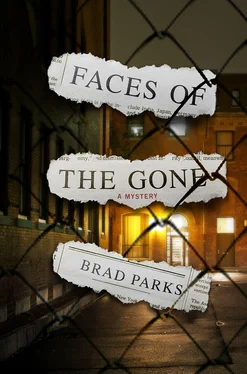Brad Parks - Faces of the Gone
Здесь есть возможность читать онлайн «Brad Parks - Faces of the Gone» весь текст электронной книги совершенно бесплатно (целиком полную версию без сокращений). В некоторых случаях можно слушать аудио, скачать через торрент в формате fb2 и присутствует краткое содержание. Год выпуска: 2010, ISBN: 2010, Издательство: Minotaur Books, Жанр: Триллер, на английском языке. Описание произведения, (предисловие) а так же отзывы посетителей доступны на портале библиотеки ЛибКат.
- Название:Faces of the Gone
- Автор:
- Издательство:Minotaur Books
- Жанр:
- Год:2010
- ISBN:9780312574772
- Рейтинг книги:3 / 5. Голосов: 1
-
Избранное:Добавить в избранное
- Отзывы:
-
Ваша оценка:
- 60
- 1
- 2
- 3
- 4
- 5
Faces of the Gone: краткое содержание, описание и аннотация
Предлагаем к чтению аннотацию, описание, краткое содержание или предисловие (зависит от того, что написал сам автор книги «Faces of the Gone»). Если вы не нашли необходимую информацию о книге — напишите в комментариях, мы постараемся отыскать её.
Faces of the Gone — читать онлайн бесплатно полную книгу (весь текст) целиком
Ниже представлен текст книги, разбитый по страницам. Система сохранения места последней прочитанной страницы, позволяет с удобством читать онлайн бесплатно книгу «Faces of the Gone», без необходимости каждый раз заново искать на чём Вы остановились. Поставьте закладку, и сможете в любой момент перейти на страницу, на которой закончили чтение.
Интервал:
Закладка:
“Now, we can do this one of two ways,” I continued. “I can team up with a forensic accountant and crawl through every line of your budget. No matter what we find, we’ll run a headline that says, ‘The drug war’s answer to the $1,000 hammer,’ along with grainy head shots of you and your bosses that make you look like criminals. And your wife can explain to her friends at playdates that the article wasn’t really that bad.
“Or you can spare me the runaround and we can play nice and share some information. It’s up to you.”
It was empty saber rattling, of course. My bosses frowned on using the newspaper to carry out reporters’ vendettas. And, in any event, I didn’t really have the time-or the interest-to do the kind of intensive reporting I had just described.
But L. Pete, who looked like he had just taken a very large bite of lemon, didn’t necessarily know that. I think my sudden lack of house and cat gave me just enough credibility as a crazy that he was taking me seriously.
“I, uh. .” he began. “Will you excuse me for a moment?”
He left without another word and, I’m sure, headed next door to ask his boss what to do with the lunatic reporter in his office. I hoped they would come to the conclusion I needed to be placated.
He returned five minutes later.
“Can we be off the record?” he asked.
“Sure.”
“Good,” he said. “I’ve been authorized to tell you certain things but not other things. You understand we have people in the field working on this and the wrong information in the wrong hands could be disastrous. We’re not putting our people at risk, no matter how many exposes you write about us.”
“Fair enough,” I said.
He paused then said, “The first thing I’m authorized to tell you is that we have good reason to believe this is the work of Jose de Jesus Encarceron.”
“I’m supposed to know who he is?”
“Colombian drug lord, and a real badass one,” L. Pete said. “Some of the things he’s done make other drug lords look like street-corner hustlers. Our agency has a file on this guy that could fill your garage.”
“I don’t have a garage anymore.”
“Right. Sorry. Point is, we’ve been after this guy for more than five years now. And I don’t mean to sound insensitive, but those bodies down on Ludlow Street are just four more debits on a very large tab.”
“So this guy sits in his palace in Bogota, orders the hit, and the local muscle takes care of it?”
“Something like that, yes,” L. Pete said.
“So why don’t you start by going after the local muscle?”
“I’m afraid that falls under the category of things I can’t tell you.”
“And Encarceron’s people are responsible for distributing ‘The Stuff’ brand?”
“Can’t tell you that, either,” L. Pete said, shifting his weight uneasily.
“Why, because he’s slipping it past you guys at the airport and you’re embarrassed by it?” I said.
He just shrugged. “Despite what you might assume about how we’re spending taxpayer money here, we’re actually quite close to putting a case together against this guy. But we have to proceed carefully or we could screw up the whole thing.”
Now it was my turn to shrug.
“Look,” I said. “I don’t care if or when you get around to putting away this Jose de Whatever guy. I care about the guy who tried to put a stick of dynamite up my ass this morning. Specifically, I’m a little worried he’ll return to finish off the job.”
“Well, that gets around to the other thing I’m authorized to tell you.”
“Which is?”
“I wouldn’t press too hard if I were you,” L. Pete said.
“Oh?”
“We have good reason to believe Encarceron’s people consider this matter settled. All the loose ends are tied up. All the evidence is destroyed. They want to go back to business as usual.
But if a certain newspaper reporter kept nosing around, kept making himself a pest, they might feel the need to exterminate the pest.”
“That sounds a bit ominous,” I said.
“Call it what you want,” L. Pete replied. “I call it prudent advice. These are some bad hombres we’re dealing with. I am urging you in the strongest possible terms to leave the Ludlow Street investigation to our agents and trust we’ll get the job done. We can’t guarantee your safety if you keep sniffing around.”
“I see,” I said. “Are you authorized to tell me anything else?”
“Nope,” he said cheerfully. “But when we’re ready to announce our charges against Encarceron, I promise we’ll give you an exclusive interview. Seems like you’re owed the pleasure.”
“Terrific,” I said, though I really meant the opposite of terrific. I had no intention of waiting for L. Pete and his fellow flatfoots to get around to making a case against some international drug lord.
But, at least for the time being, I had to keep up appearances.
L. Pete and I swapped phone numbers and bid each other a fake-fond adieu, then I departed the National Drug Bureau’s fortress with a friendly wave to the square-jaw boys. Despite my new information, I still felt wary of large men in white vans. Not to say I didn’t trust our government but. . well. . I didn’t trust our government. And since them being wrong could result in me being dead, I felt caution was still advisable.
At the very least, I wanted to educate myself more about this Jose de Jesus character. So I spurred my Malibu back to the office, where an hour of trolling through clips on Lexis-Nexis laid out a fairly complete life story. He was young for an intercontinental villain, just thirty-four. A poor street thug from Bogota, he got his start in the business in the mid-1990s, which turned out to be a fortuitous time for an ambitious would-be drug lord: Pablo Escobar had just been killed, and the instability created by his passing made it easy enough for Encarceron to rise up the ranks.
He was pretty much your garden-variety ruthless sociopath. He terrorized and/or eliminated anyone who dared oppose him, kidnapped and/or imprisoned anyone he didn’t feel like killing, bribed and/or murdered any government official who tried to slow him down, and generally didn’t play well with others.
His nickname, La Cabra-the Goat-derived from an infamous episode early in his career. He’d killed a rival’s entire family, decapitating them and placing goats’ heads on top of the stumps. Charming.
As L. Pete said, U.S. law enforcement and U.S.-backed Colombian authorities had been after the guy for a while. Within the past few years, La Cabra had climbed the ranks of the NDB’s Most Wanted and the price on his head had reached $2 million.
But Bogota was a big city and Colombia was an even bigger country. He never stayed in the same place long. And he was generous enough with the spoils of his enterprise-hosting huge cookouts, sponsoring sports teams, paying hospital bills for indigents-that people in the barrio never gave him up. Of course, fear played a part, too. Legend had it, he had once been tipped off that someone in the neighborhood was going to inform on him. The would-be snitch’s body was dragged through the streets by two horses. One towed the head and torso, the other the butt and legs.
So, yeah, he was on Santa’s naughty list. But I couldn’t drive away the thought that something didn’t feel right. Why would a drug lord in Colombia concern himself with a few Newark street dealers? And, even if he did, why kill all four at once? And why leave their bodies where they could be so easily discovered? I can’t pretend I knew a lot about the preferred modus operandi of the Colombian cartels, but this didn’t feel like it.
Besides, the identity of the person giving the orders in South America was, in some ways, just academic. There was still someone on this side of the equator pulling the trigger. And it bothered me that my government, in its zeal to put La Cabra’s head on its mantel, was treating this trigger-puller like he was such a trivial piece in a larger game.
Читать дальшеИнтервал:
Закладка:
Похожие книги на «Faces of the Gone»
Представляем Вашему вниманию похожие книги на «Faces of the Gone» списком для выбора. Мы отобрали схожую по названию и смыслу литературу в надежде предоставить читателям больше вариантов отыскать новые, интересные, ещё непрочитанные произведения.
Обсуждение, отзывы о книге «Faces of the Gone» и просто собственные мнения читателей. Оставьте ваши комментарии, напишите, что Вы думаете о произведении, его смысле или главных героях. Укажите что конкретно понравилось, а что нет, и почему Вы так считаете.












